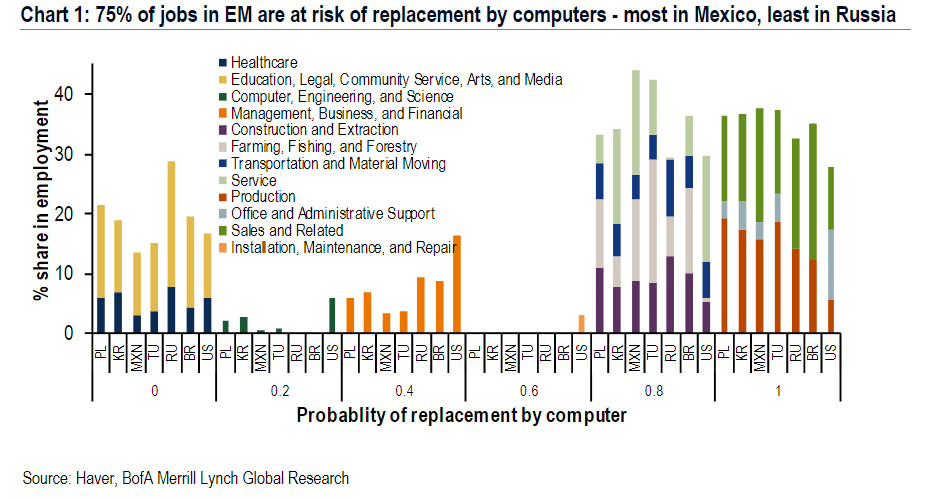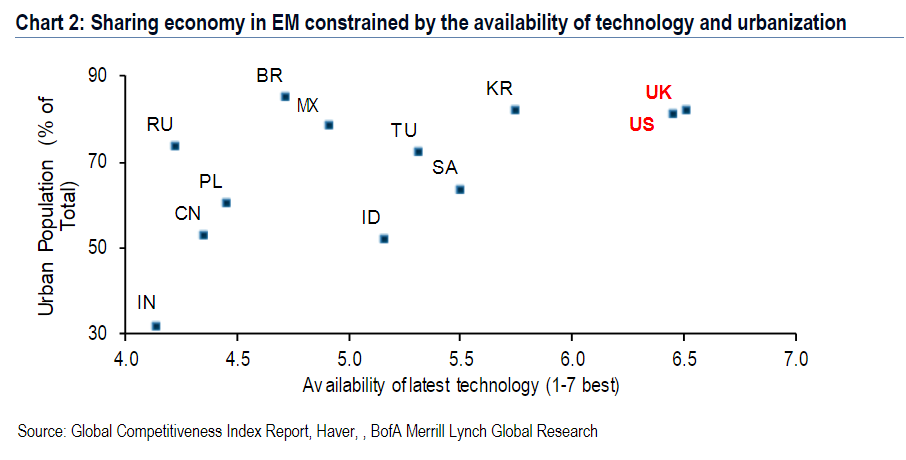Look Out Emerging Markets, The Robots Are Coming
Oct 13, 2017
The machines are coming! The narrative that no one will have a job by 2050 is nothing new – scholars, economists and other pundits have been painting the demise of the global workforce for a number of years. In 2013, the University of Oxford released a paper titled "The Future of Employment: How Susceptible Are Jobs to Computerisation?" that concluded that 47 percent of jobs in the U.S. are at risk of automation within the next 20 years.
Four years since the study and the unemployment rate is at its lowest point in over a decade. The narrative has grown tired; however, while job growth in developed countries remains strong in the years after the Great Recession, attention is turning to emerging market countries where jobs look riskier. "We estimate about 75% of jobs in EM are highly susceptible to replacement by robots, an even greater share than the already high number in the US," Bank of America said in a research note.
"We apply their estimated probabilities of computerization for each sector to the OECD sectoral employment statistics. For the countries with the required statistics available, Mexico (80%) has the highest share of jobs at risk, and Russia has the lowest (60%)."

The industries set to suffer from the invasion of the robots are production and computer science & engineering. This is especially concerning for Mexico with close to 30 percent of its workforce in these two categories. At the other end of the spectrum, healthcare and education remain safe from the machines. (For now?)
Will Emerging Markets Share in Sharing Economy Disruption?
Though job markets in many emerging market countries have top-heavy "robot-replaceable" sectors, the economic disruption being experienced in developed economies thanks to the growing sharing economy may be further down the road. In a sharing economy, technology like the smartphone and the gig-economy app allow individuals to monetize small amounts of capital (think the extra room in your house or a car that sits idle most of the day). Assets that used to be expensive, like a hotel room or a New York City taxi medallion lose value dramatically, and the people who made money off of them either have to work for much less or risk losing their job. But because sharing economy technology hasn't penetrated deeply into emerging economies – yet – their job markets may not suffer the same disruptive shocks as developed economies.

Furthermore, a sharing economy exhibits high levels of urbanization, something that is evident more in developed markets than emerging markets.
Take Away
Automation remains a hot topic in the U.S. job market. However, with unemployment at 4.2 percent and over 1.2 million jobs added in 2017, that narrative has somewhat stalled. However, the same can't be said for emerging market counties such as Russia and Brazil. With large sectors of their workforce in 'Robot Replaceable' jobs, they are ripe for automation. While these countries don't exhibit a sharing economy, could a machine takeover be when not if?
Source: Investopedia